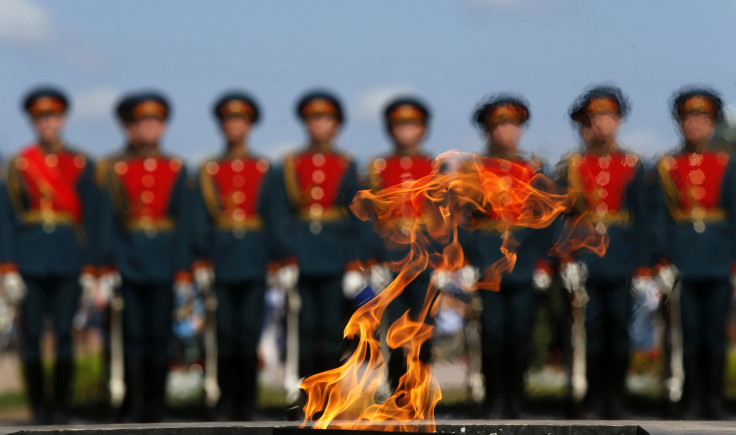Cash Crunch, Sanctions Hurting Russia's Grand Plans To Modernize Military

As Moscow prepares for a big show of military might Saturday, its quiet cuts to defense spending are not escaping notice. Beneath all the pomp and ceremony of its Victory Day celebration lies the crunch of an economic crisis -- sparked by Western sanctions, a steep decline in global oil prices and devaluation of the ruble.
So while parades are planned for the 70th anniversary of Russia's victory in World War II -- and ceremonies will include marching soldiers, rolling armaments and air force flyover maneuvers, Russia's message that all is well is increasingly difficult for many to believe. Some analysts say Russia's economy will shrink 4.6 percent in 2015.
In 201o, President Vladimir Putin announced a budget of 20 trillion rubles ($650 billion) to modernize the Russian military. The country's defense spending doubled between 2007 and 2013, largely because of plans to replace 70 percent of aging armaments from the Soviet era.
Contrast this with the quiet jubilation of the U.S, where the Republican-led Congress on May 5 passed an annual defense budget of $3.8 trillion, beginning Oct. 1. Despite political differences, the GOP-led Congress basically met Democratic President Barack Obama's call for a $4 trillion defense budget, Agence France-Presse reported.
This year, Russia planned to replace 30 percent of its military equipment, launch 50 new warships and introduce T-14 Armata tanks. But government statistics reveal that defense budget will have to take a cut of 5 percent in 2015. Adding frustration was the embarassing breakdown of a T-14 Armata tank during Victory Day preparations.
CAST, a defense think tank in Moscow, said that the Russian economy is not generating enough revenue to pay for the 2011-20 defense modernization program. So, the opportunity for renewing the Russian armed forces and its equipment is looking bleak.
At the same time, Russia cannot ignore the military exercises being conducted in its backyard in May by NATO countries. For example, the northern borders of Russia are witnessing convergence of 21,000 Estonian, Latvian and Norwegian troops. Any thought that NATO is still rattled by Russia's annexation of Crimea seems passé as a new rapid-reaction force has given NATO the strength to deal with any contingency in Eastern Europe.
The NATO-led "Operation Hedgehog” has been designed as a ground exercise involving Estonia and others, with 13,500 total troops. NATO’s rising assertiveness will likely draw conspiracy theories from Putin, in which he paints Russia as a victim of U.S. efforts to isolate Russia -- with the aim of forcing regime change.
For feedback/comments, contact the writer at k.kumar@ibtimes.com.au
© Copyright IBTimes 2025. All rights reserved.





















